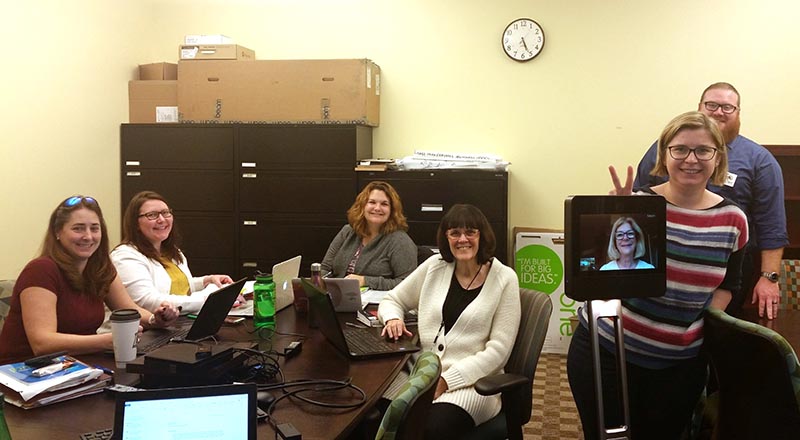SU Ed.D. Program Uses iBeam Robot to Reach Remote Students
 SALISBURY, MD---A new iBeam Robot is helping Salisbury University’s Doctor of Education (Ed.D.) program reach students in remote locations.
SALISBURY, MD---A new iBeam Robot is helping Salisbury University’s Doctor of Education (Ed.D.) program reach students in remote locations.
“The robot provides a unique, convenient way to participate in the doctoral program while limiting long distance travel to and from class,” said Dr. Laurie Andes, faculty in SU’s Samuel W. and Marilyn C. Seidel School of Education. “We are hoping to expand access to students across the mid-Atlantic.”
One student, Marcie Stutzman, has cut her 3.5 hour commute from Frederick, MD, down to four times each semester.
“The robot has really made it possible to be ‘in’ class and truly participate even though I’m in my home office,” Stutzman said. “I can hear the professor and all my colleagues with a much better quality than I could with video conferencing, and I can see what is going on in the room just by rotating myself.”
The robot, Andes explained, is similar to a tablet on a moveable device. The operator speaks through an application and is seen by viewers on the screen.
“It allows Marcie to move around the classroom, and join in with working groups of students, as if she were present physically,” Andes said. “She can turn it to look at the front of the room or to speak to her colleagues.”
SU students showcased the iBeam robot at the Maryland Literacy Conference in Hunt Valley. Using a laptop, interested attendees manipulated the robot, which was back on campus in a Conway Hall seminar room.
“They had fun driving it down the hall and meeting our administrative assistant and nearby faculty,” Andes said.
SU’s Ed.D. program started in 2014. An inaugural cohort of six students graduates this spring. The hybrid program offers a mix of online and face-to-face classes – a format which many students prefer, Andes said.
“I chose Salisbury’s Doctorate in Literacy because it has a very practical orientation,” said Stutzman, who teaches French and Spanish at Middletown High School. “I wanted a doctoral program that valued working educators, and focused more on teaching practice rather than administration. I wanted a program that would allow me to continue teaching full time, and tailor my research to what interests me in the field. Additionally, I wanted personal connections with professors and colleagues, so I appreciated Salisbury’s hybrid structure. There are not very many programs like this one, so I was really happy to find one in a reasonable distance and with in-state tuition!”
Stutzman added: “Faculty have been very flexible in arranging a schedule with me. Any teacher who is looking to pursue a personal interest or a graduate degree in their field should look at Salisbury’s Ed.D. program. The students have a wide variety of goals and are interested in all kinds of different literacies – digital and new media, special education, mathematics, and second language, to name a few.”
Pictured, above, is Stutzman (on screen) with classmates in Andes’ Foundations of Research course. From left are Jennifer Reburn, Sarah Crebs, Amy Palmer, Mar-Jo Ulbricht, Diana Schultz and William Tignor.
For more information, call 410-543-6030 or visit the SU website at www.salisbury.edu.
